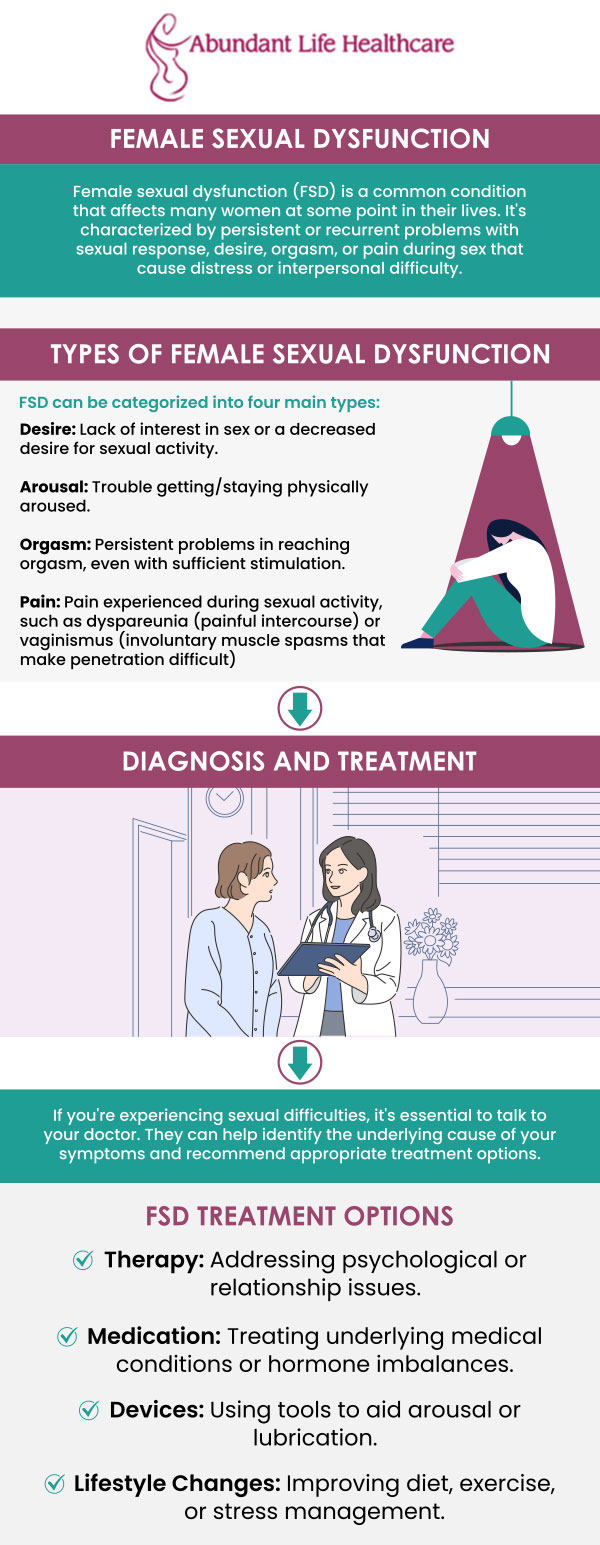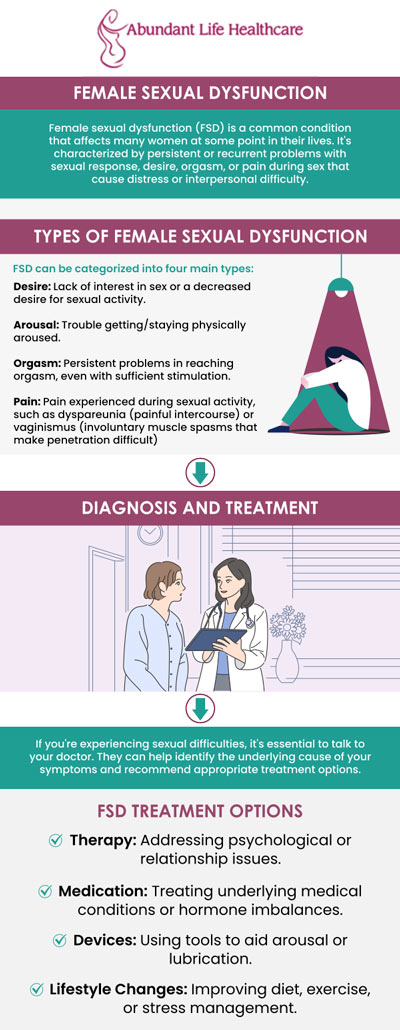Female Sexual Dysfunction Treatment Specialist Q&A
Experiencing sexual dysfunction can happen at any point during the sexual response cycle and can prevent you from feeling pleasure during sexual interactions. According to the National Health and Social Life Survey, it’s estimated that 43% of women experience female sexual dysfunction in the United States, regardless of age. If you’re currently experiencing any symptoms of sexual dysfunction, it’s recommended that you reach out to our board-certified OB/GYN Dr. Marc Jean-Gilles, DO, FACOG at Abundant Life Healthcare to receive a proper diagnosis and explore potential treatment options. For more information, contact us today or book an appointment online. We are conveniently located at 601A Professional Drive, Suite 370, Lawrenceville, GA 30046.




Table of Contents:
What are the symptoms of female sexual dysfunction?
How do you deal with sexual dysfunction?
How do you know if you have sexual dysfunction?
What are the three types of sexual dysfunction?
Female sexual dysfunction encompasses a range of conditions that impact a woman’s sexual experience and desire. Some common symptoms of sexual dysfunction in women include:
• Decreased libido – Female sexual dysfunction can manifest as a reduced interest in sexual activity or a lack of sexual desire compared to previously.
• Difficulty becoming aroused – Trouble achieving or maintaining arousal can lead to significant challenges in achieving sexual satisfaction.
• Pain during intercourse – Pain or discomfort during penetration, known as dyspareunia, can make sexual activity unpleasant or even unbearable.
• Lack of lubrication – Lack of natural vaginal lubrication can make intercourse uncomfortable or painful.
• Anxiety or stress – Feelings of anxiety, guilt, or shame related to sexual experiences can arise due to sexual dysfunction.
• Negative body image – Sexual dysfunction can result in a negative perception of one’s body. This can, in turn, impact sexual confidence and satisfaction.
Female sexual dysfunction arises from physical, psychological, and hormonal factors, and it can significantly affect a woman’s overall well-being and relationships. Open communication with a healthcare provider is key to accurately identifying the underlying cause of the problem. This will also allow you to explore a variety of treatment options to improve your sexual health and quality of life.
Dealing with sexual dysfunction involves a multifaceted approach that addresses the physical, emotional, and psychological aspects. Some helpful pointers when coping with sexual dysfunction include:
• Communication – It’s encouraged to openly discuss concerns with your partner to foster understanding, support, and intimacy.
• Seek medical advice – By consulting a healthcare professional, you can become aware of underlying physical issues and explore effective treatment options. Counseling may be recommended to address the psychological factors that contribute to sexual dysfunction.
• Stress management – It’s useful to choose and practice a relaxation technique, such as meditation or deep breathing, to reduce stress and anxiety related to sexual experiences.
• Healthy lifestyle – By maintaining a balanced diet, engaging in regular exercise, and getting an adequate amount of rest, you can not only promote your overall wellness but also positively impact your sexual health.
• Experimentation – You can try exploring different forms of intimacy and sexual activities with your partner to find what feels comfortable and enjoyable.
• Pelvic floor exercises – Certain pelvic floor muscle exercises, known as Kegels, can significantly strengthen the pelvic area and enhance sexual function.
Recognizing sexual dysfunction involves being attentive to changes or difficulties in your sexual experiences and responses. Some signs of sexual dysfunction are:
• Orgasm difficulties – Difficulty reaching orgasm is often a result of sexual dysfunction.
• Lack of desire – This presents as a significant decrease in sexual desire as compared to your normal libido.
• Difficulty in arousal – Even if your desire is not affected, you may struggle to become physically aroused due to sexual dysfunction.
• Pain – Sexual dysfunction can cause you to experience pain or discomfort during sexual activities such as penetration.
• Relationship strain – Sexual issues can result in tensions or conflicts in the relationship.
• Avoidance – If you find yourself avoiding sexual encounters altogether due to fear or frustration, this is a sign of sexual dysfunction.
• Lack of satisfaction – It’s common to feel dissatisfied or unfulfilled with sexual experiences as a result of sexual dysfunction.
If you notice persistent and distressing changes in your sexual functioning, it’s advised to consult a medical professional. Our experts can identify the root cause of the dysfunction, offer advice, and create personalized solutions to improve your sexual health and overall wellness.
There are three main types of sexual dysfunction, each involving unique challenges:
• Desire disorders – This type involves a significant decrease in sexual desire. People experiencing desire disorders have a reduced interest in initiating or engaging in sexual activities, leading to a decrease in overall sexual desire.
• Arousal disorders – Arousal disorders refer to difficulties in becoming aroused during sexual activities. In men, this can manifest as difficulty achieving or maintaining an erection, while in women, it can present as low vaginal lubrication.
• Orgasm disorders – These sexual dysfunction disorders concern difficulties in achieving orgasm or a significant delay in reaching climax. Symptoms of orgasm disorders often result in frustration and dissatisfaction with sexual experiences.
Dr. Marc Jean-Gilles, DO, FACOG at Abundant Life Healthcare provides effective erectile dysfunction evaluations and treatments, tailoring treatment to each patient’s specific requirements. For more information, contact us today or book an appointment online. We are conveniently located at 601A Professional Drive, Suite 370, Lawrenceville, GA 30046. We serve patients from Lawrenceville GA, Suwanee GA, Snellville GA, Duluth GA, Dacula GA, Lilburn GA, Loganville GA, Auburn GA, and surrounding areas.
Check Out Our 5 Star Reviews


Additional Services You May Like

Additional Services You May Like
- Obstetrics
- Pregnancy
- Gynecologist
- Birth Control
- Labiaplasty
- Microblading
- Weight Loss
- Semaglutide GLP-1
- Pap Smears
- Pelvic Pain
- Laser Hair Removal
- In House Ultrasound (Including 3D)
- Vaginal Birth After C-Section (VBAC)
- Pregnancy As High Risk
- Multiple Gestations
- Postpartum Counseling
- 24hour/365days On Call Service
- Annual Exam
- Abnormal Uterine Bleeding
- Management Of Endometriosis
- Ultrasound
- Pelvic Organ Prolapse
- Urinary Incontinence
- Perimenopause And Menopause
- Sexual Dysfunction
- Fat Freeze (Like Cool Sculpting)
- Body Contouring
- Ozempic
- Civil Surgeon
- Hormone Replacement Therapy
- Immigration Medicine
- Biote Hormone Pellets
- GLP-1
- Peptide Therapy




